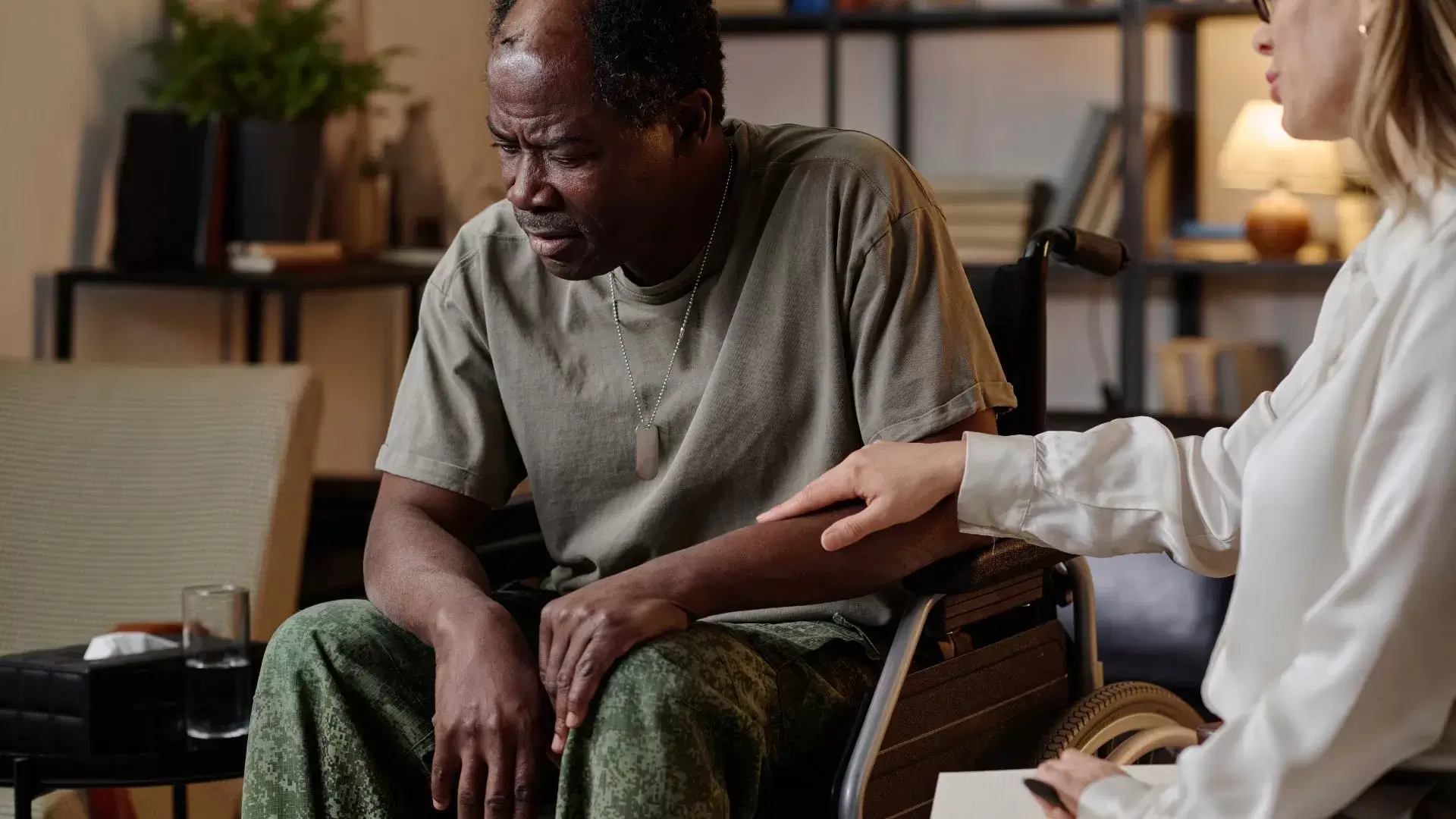Trauma and PTSD Psychotherapy
We recognize that facing trauma and PTSD can be an intimidating experience, but we’ve got compassionate psychotherapy options to help us heal. Specialized therapies like Cognitive Behavioral Therapy (CBT) and Eye Movement Desensitization and Reprocessing (EMDR) are designed to support our unique journeys. In a trauma-informed environment, we can feel safe and empowered to explore our experiences and emotions. It’s crucial to recognize the symptoms and effects of PTSD while also considering supportive strategies, such as community support and mindfulness. If we’re ready to take this step, there’s much more to explore on the path to recovery.We recognize that dealing with anxiety disorders can be incredibly challenging, but psychotherapy offers a supportive path toward healing. Our tailored counseling services address various anxiety types, such as Generalized Anxiety Disorder or PTSD, using evidence-based approaches like Cognitive Behavioral Therapy and mindfulness techniques. These therapies empower us to confront fears, identify negative thought patterns, and develop healthier coping strategies. It’s important to remember you’re not alone in this journey. Together, we can explore how therapy can improve your emotional well-being and resilience against anxiety. There’s so much more we can share to support you on this path.

About Our Psychotherapy Counseling Services
At Psychotherapy Counsellors, we recognize that seeking help is a courageous step, and we’re here to provide compassionate psychotherapy counseling services tailored to your unique needs. Our approach centers on trauma therapy, understanding that each individual’s experience is distinct. We specialize in effective PTSD treatment methods, including cognitive behavioral therapy for PTSD and EMDR, both designed to help you process traumatic memories and regain control over your life.
In our trauma counseling sessions, we emphasize trauma-informed care, ensuring that you feel safe and supported throughout the healing process. We believe in the importance of emotional regulation, equipping you with tools to manage intense feelings that often accompany PTSD. Our therapists are trained to guide you through the complexities of PTSD recovery, offering a safe space to explore your thoughts and feelings.
Additionally, we encourage participation in our PTSD support groups, where you can connect with others who understand your journey. By fostering a community of empathy and shared experiences, we aim to reduce isolation and promote healing. Together, we can navigate the path toward recovery and resilience, helping you reclaim your life after trauma.
Understanding PTSD: Causes and Symptoms
Understanding PTSD requires us to recognize the various causes and symptoms that can profoundly impact individuals who have experienced trauma. Post-traumatic stress disorder (PTSD) often emerges after a person faces a distressing event, leading to a range of emotional and psychological challenges.
We must acknowledge that PTSD symptoms can manifest differently for everyone. Common signs include flashbacks, where individuals relive traumatic moments, and intrusive thoughts that can disrupt daily life. Emotional triggers may provoke feelings of anxiety, making it hard for us to navigate our environments. Hypervigilance, or an exaggerated state of alertness, can leave individuals feeling constantly on edge, while avoidance behavior prevents them from confronting reminders of the trauma.
Recognizing these symptoms is essential in our journey toward trauma recovery. By understanding the complexities of PTSD, we can foster a supportive environment for healing. Together, we can encourage open conversations about PTSD and create pathways that help individuals reclaim their lives. It’s important to remember that healing takes time, and seeking help is a significant step in managing PTSD symptoms and reducing anxiety.
Types of Trauma: Acute, Chronic, and Complex PTSD
Trauma can be categorized into three main types—acute, chronic, and complex PTSD—each with its own unique impact on our mental health and well-being. Acute stress disorder typically arises after a single traumatic event, leading to short-term PTSD symptoms like anxiety and flashbacks. While this can be distressing, many find that with proper support, trauma healing can occur relatively quickly.
Chronic trauma, on the other hand, results from prolonged exposure to distressing situations, such as ongoing abuse or neglect. This type can greatly affect our emotional health, making PTSD diagnosis more complex, as symptoms may fluctuate over time.
Complex PTSD often stems from childhood trauma or repeated traumatic experiences. It can manifest in severe PTSD symptoms management challenges, including difficulties with relationships, emotional regulation, and trauma processing. Understanding our PTSD triggers is essential for effective healing.
Recognizing these types of trauma enables us to approach our healing journey more effectively. By embracing the process of trauma healing, we can work toward reclaiming our emotional health and finding a path to resilience. Together, we can support one another in steering through this challenging yet transformative journey.
Trauma-Informed Care Approach
Recognizing the different types of trauma we’ve discussed helps us appreciate the significance of a trauma-informed care approach, which prioritizes safety, trustworthiness, and empowerment in our healing journey. This approach acknowledges the impact of trauma on our emotional well-being and fosters a supportive environment.
In trauma-informed care, we focus on building strong relationships, which can be particularly essential when dealing with relational trauma. It encourages us to explore various PTSD treatment options tailored to our unique experiences, ensuring we feel safe and understood. Utilizing effective PTSD therapy techniques can also aid in managing PTSD symptoms more effectively.
Moreover, trauma counseling services play an important role in providing us with the necessary resources for healing from PTSD. These services often incorporate stress management strategies, helping us navigate our emotions and responses. With access to diverse PTSD resources, we can learn to empower ourselves and take an active role in our recovery.
Ultimately, adopting a trauma-informed care approach enables us to feel more confident in our healing journey, supporting us as we work towards emotional well-being and resilience. Together, we can foster a sense of hope and healing.

Cognitive Behavioral Therapy (CBT) for PTSD
Cognitive Behavioral Therapy (CBT) offers us a structured and practical approach to address the challenges of PTSD, helping to reshape our thoughts and behaviors in a supportive environment. Through CBT, we can develop effective coping mechanisms that target trauma-related anxiety and emotional numbness, fostering PTSD resilience. This therapy encourages us to identify and challenge negative thought patterns that often accompany our experiences.
Incorporating various trauma therapy approaches, CBT helps us explore how our thoughts influence our feelings and actions. By learning specific PTSD coping strategies, we can build skills that promote stress reduction and enhance our overall well-being. Mindfulness for PTSD is also integrated into CBT, guiding us to stay present and grounded in our emotions, which is essential for healing.
As we engage in this process, we can improve not just our mental health, but also our relationships. Understanding the impact of PTSD on our connections helps us communicate better with loved ones, fostering support and empathy. Together, through CBT, we can navigate the complexities of PTSD and work towards a more fulfilling life.
Exposure Therapy for Trauma Recovery
Building on the foundation of Cognitive Behavioral Therapy, Exposure Therapy provides us with a targeted method to confront and process the memories and feelings associated with our trauma, helping us reclaim our lives. This trauma-focused therapy encourages us to gradually face our fears, allowing us to desensitize ourselves to the distressing memories that often trigger panic attacks and trauma flashbacks.
As we engage in exposure therapy, we can work towards trauma resolution, addressing the underlying causes of our PTSD mental health challenges. For many, especially those dealing with PTSD in veterans, this approach is essential for managing PTSD and sleep issues, ultimately leading us to post-traumatic growth.
EMDR: Eye Movement Desensitization and Reprocessing
Often regarded as a powerful tool in trauma therapy, EMDR helps us process distressing memories through guided eye movements, promoting healing and emotional resilience. This approach, known as Eye Movement Desensitization and Reprocessing, is especially effective for those dealing with trauma and addiction, including individuals experiencing military PTSD and combat stress.
During EMDR sessions, we work with a trained mental health counselor to identify distressing memories and their associated fear responses. By using bilateral stimulation—often through eye movements—we can facilitate the reprocessing of these memories, reducing their emotional charge and helping us reconnect with our present selves. This process can also address symptoms of dissociation, allowing us to integrate our experiences more fully.
Incorporating EMDR into our broader PTSD self-care strategy can be transformative. It aligns well with holistic therapy concepts, as it addresses both the mind and body, fostering overall mental health. Through this supportive approach, we can reclaim our narratives and build resilience, paving the way for a brighter future. EMDR serves as a reminder that healing is possible and that we’re not alone on this journey.
Mindfulness and Emotional Regulation Techniques
As we explore additional strategies for managing trauma, mindfulness and emotional regulation techniques can play an essential role in enhancing our overall well-being and resilience. By practicing mindfulness, we can ground ourselves in the present moment, helping to alleviate the anxiety often associated with PTSD. This practice encourages us to observe our thoughts and feelings without judgment, which can be critical in processing traumatic memories and reducing nightmares.
Emotional regulation techniques, often integrated within cognitive-behavioral therapy, empower us to recognize and manage our emotional responses. These skills can be particularly beneficial for those dealing with the aftermath of trauma, enabling us to respond to stressors more effectively rather than resorting to unhealthy coping mechanisms, such as substance abuse.
Holistic therapy approaches can also complement mindfulness practices, emphasizing the importance of family support and community connection in our healing journey. By fostering a supportive environment, we strengthen our emotional resilience and create a safe space for processing our experiences. Together, we can cultivate mindfulness and emotional regulation techniques to navigate our trauma, ultimately leading to a more balanced and fulfilling life.
Trauma Therapy for Specific Groups
Steering through trauma requires tailored approaches, and it’s important to recognize that different groups, such as veterans, survivors of abuse, or individuals from marginalized communities, often face unique challenges and needs in their healing journeys. For veterans, addressing PTSD and work challenges can be transformative, while survivors of sexual trauma may benefit from trauma-focused cognitive behavioral therapy (CBT) that emphasizes safety and empowerment.
When we consider PTSD in children and teens, it’s imperative to involve family support to foster a secure environment for healing. For young individuals, integrating holistic therapy practices can help alleviate symptoms of depression and anxiety, promoting resilience and emotional health.
Moreover, we can’t overlook the connection between PTSD and substance abuse; understanding this relationship is critical for effective treatment. Relapse prevention strategies tailored to each group can greatly enhance their recovery process. By acknowledging these specific needs, we create a supportive space that empowers individuals to confront their trauma, reclaim their narratives, and ultimately foster healing. Together, we can navigate these paths, ensuring that everyone receives the compassionate care they deserve.
Coping Strategies for PTSD and Trauma Healing
Finding effective coping strategies for PTSD and trauma healing can empower us to navigate our emotions and reclaim our sense of safety and well-being. One important strategy is grounding techniques. These help us stay present when memories of our trauma resurface. Simple practices like focusing on our breath or engaging our senses can be incredibly beneficial.
Additionally, establishing a support network is vital. Whether it’s friends, family, or support groups, sharing our experiences can lighten the emotional load. If we’re in Oakville, Ontario, we can reach out to local resources for assistance.
Mindfulness and meditation also play a significant role in managing PTSD and memory. By incorporating these practices into our daily routine, we can cultivate a deeper awareness of our thoughts and feelings, allowing us to process them more effectively.

PTSD and Co-Occurring Conditions
Many of us grappling with PTSD may also face co-occurring conditions, such as anxiety, depression, or substance abuse, which can complicate our healing journey. These overlapping issues can intensify our distress and make it harder to focus on recovery. It’s important to recognize that we’re not alone in this struggle; many individuals experience similar challenges.
When we deal with anxiety alongside PTSD, we might find ourselves trapped in a cycle of fear and hypervigilance. Depression can drain our motivation, leaving us feeling isolated and hopeless. Substance abuse may seem like a temporary escape, but it often exacerbates our symptoms and hinders genuine healing.
Addressing these co-occurring conditions is essential for effective treatment. Seeking support from mental health professionals who understand the complexities of PTSD and its associated disorders can be incredibly beneficial. They can help us navigate these interwoven challenges, providing tailored strategies to manage both PTSD and our co-occurring conditions.
Relational Impact of PTSD and Trauma
The challenges we face with PTSD and co-occurring conditions often spill over into our relationships, creating strain and misunderstandings with those we care about most. When we experience symptoms like irritability, withdrawal, or emotional numbing, our loved ones may feel confused or rejected. They might not understand why we seem distant or why we react strongly to seemingly minor triggers.
These relational impacts can lead to feelings of isolation, not just for us but for our partners, family, and friends as well. They may struggle with their own feelings of helplessness or frustration, unsure of how to support us. Open communication is vital in these situations. By sharing our experiences, we can help our loved ones comprehend the challenges we’re facing, fostering empathy and connection.
It’s also important to recognize that relationships can be a source of healing. When we engage in supportive dialogues and set healthy boundaries, we can create a safe space for both ourselves and our loved ones. Together, we can navigate the complex landscape of PTSD, reinforcing our bonds and promoting understanding. Remember, we’re not alone in this; it’s a journey we can undertake together.
Holistic Approaches to PTSD Treatment
Holistic approaches to PTSD treatment offer us a thorough way to heal, addressing not just the symptoms but the whole person and their experiences. By integrating body, mind, and spirit, we can create a more all-encompassing healing journey. Techniques such as mindfulness, yoga, and meditation help us ground ourselves in the present moment, reducing anxiety and fostering emotional regulation.
Nutrition also plays a crucial role in our healing process. Eating well can enhance our mood and energy levels, making it easier for us to engage in therapy and daily activities. Additionally, we might explore creative therapies like art or music, which allow us to express emotions that words often fail to capture.
Community support is equally essential. Cultivating connections with others who understand our struggles can foster a sense of belonging and validation. We can also consider alternative therapies such as acupuncture or herbal medicine, which some find beneficial for managing symptoms.
Ultimately, by embracing a holistic approach, we’re acknowledging that healing from PTSD isn’t just about alleviating symptoms; it’s about nurturing our entire being and creating a more balanced, fulfilling life. Together, we can navigate this transformative journey towards recovery.
PTSD Recovery: Post-Traumatic Growth and Healing
As we explore the journey of healing from PTSD, it’s important to recognize that recovery can lead to profound personal growth and transformation, often referred to as post-traumatic growth. This process isn’t just about overcoming the trauma; it’s about finding new meaning and strength in our experiences.
Many of us may find that, after facing our pain, we gain a deeper appreciation for life and our relationships. We might develop a stronger sense of empathy, realizing we’re not alone in our struggles. This newfound perspective can empower us to advocate for ourselves and others, fostering resilience that we didn’t know we had.
Additionally, we might discover that our values shift, guiding us to prioritize what truly matters. This journey invites us to reflect on our strengths, encouraging us to embrace vulnerability as a powerful tool for connection and healing.
While the path of post-traumatic growth can be challenging, it’s essential to remember that it’s possible. Together, we can support one another in maneuvering through these complexities, celebrating the small victories along the way as we emerge stronger and more compassionate individuals.
Reach Out for Professional Trauma and PTSD Therapy Services
Reaching out for professional trauma and PTSD therapy services can be an essential step in our healing journey, providing us with the support and tools necessary to navigate the complexities of our experiences. It’s important to remember that we’re not alone; many of us have faced similar challenges and have benefited from seeking help.
When we connect with trained therapists, we gain access to their expertise in trauma and PTSD. They can guide us through evidence-based techniques, such as Cognitive Behavioral Therapy (CBT) or Eye Movement Desensitization and Reprocessing (EMDR), tailored to our unique needs. These methods can help us process our trauma and develop healthier coping strategies.
Moreover, therapy offers a safe space where we can express our feelings without judgment. It’s a place to share our stories, validate our emotions, and begin to reclaim our lives. By reaching out for help, we’re taking a courageous step towards healing, and we deserve that support.
Frequently Asked Questions
How Long Does PTSD Therapy Typically Take to Show Results?
When we think about therapy in general, it often varies in duration for everyone. Typically, we might start noticing some positive changes within a few sessions, but for deeper healing, it could take several months. It’s important for us to remember that everyone’s journey is unique, and progress can look different for each person. Let’s stay patient and committed, knowing that every step we take is a part of our growth.
Can I Attend Therapy Sessions Virtually or Only In-Person?
We recognize that attending therapy is a big step, and it’s great to explore your options. Many therapists now offer both virtual and in-person sessions, allowing us to choose what feels most comfortable for us. Virtual sessions can be just as effective, providing flexibility and convenience. Ultimately, it’s about finding the right fit for our needs, so we can feel safe and supported on our journey.
Are There Age Restrictions for Trauma Therapy?
When it comes to age restrictions for therapy, we understand that many practices don’t impose strict limits. Instead, they often tailor their approach based on individual needs. It’s essential for us to find the right fit for everyone, regardless of age. Therapy can be beneficial for all ages, and we’re here to support that journey. If we have concerns, reaching out to a professional can help clarify what’s best for us.
Will My Insurance Cover PTSD Psychotherapy Services?
When it comes to insurance coverage for psychotherapy services, we should always check with our specific insurance provider. Most plans have different policies regarding mental health services, so it’s essential to review our benefits. We can also ask our therapist for any necessary documentation to help with the process. Remember, it’s okay to advocate for ourselves and seek clarification; understanding our coverage can make a significant difference in accessing the support we need.
How Do I Find a Qualified Trauma Therapist?
Finding a qualified therapist can feel overwhelming, but we can approach it step by step. First, we should consider our needs and preferences. Next, we can ask for recommendations from friends or check online directories. It’s important to review their qualifications and specialties. Once we have a few options, we can schedule consultations to see who we feel most comfortable with. Remember, it’s okay to take our time in finding the right fit.

